- Home
- Jodi Picoult
Perfect Match Page 6
Perfect Match Read online
Page 6
Nathaniel sits like a stone gargoyle on his stool, his lips pressed together, resisting my attempts to get some food into him. He has not eaten since breakfast the previous day. I have held up everything from maraschino cherries to a gingerroot, the whole contents of the refrigerator from A to Z and back again. "Nathaniel." I let a lemon roll off the counter. "Do you want spaghetti? Chicken fingers? I'll make you whatever you want. Just pick."
But he only shakes his head.
If he does not eat, it isn't the end of the world. No, that was yesterday. But there is a part of me that believes if I can do this--fill my son--it will keep him from hurting inside. There's a part of me that remembers the first job of a mother is to feed her child; and if I can succeed at this one small thing, maybe it will mean I have not completely failed him.
"Tuna? Ice cream? Pizza?"
He begins to turn slowly on the stool. At first it is a mistake--a slip of his foot that sets him spinning. Then he does it deliberately. He hears me ask a question and he very purposefully ignores me.
"Nathaniel."
Twirl.
Something snaps. I am angry at myself, at the world, but because it is easier, I lash out at him. "Nathaniel! I am speaking to you!"
He meets my gaze. Then lazily pivots away from me.
"You will listen to me, now!"
Into this charming domestic scene walks Patrick. I hear his voice before he finds us in the kitchen. "Armageddon must be coming," he calls out, "because I can't think of any other reason that would keep you away from work two days straight, when--" As he turns the corner, he sees my face and slows down, moving with the same care he'd use to enter a crime scene. "Nina," he asks evenly, "are you all right?"
Everything Caleb said about Patrick last night hits me, and I burst into tears. Not Patrick, too; I couldn't stand for more than one pillar of my world to crumble. I just cannot believe that Patrick might have done this to my son. Here's proof: Nathaniel hasn't run screaming from him.
Patrick's arms come around me and I swear, if not for that, I would sink onto the floor. I hear my voice; it's uncontrollable, a verbal twitch. "I'm fine. I'm a hundred percent," I say, but my conviction shakes like an aspen leaf.
How do you find the words to explain that the life you woke up in yesterday is not the one you woke up in today? How do you describe atrocities that aren't supposed to exist? As a prosecutor, I have buffeted myself with legalese--penetration, molestation, victimization--yet not a single one of these terms is as raw and as true as the sentence Someone raped my son.
Patrick's eyes go from Nathaniel to me and back again. Is he thinking that I've had a breakdown? That stress has snapped me in half? "Hey, Weed," he says, his old nickname for Nathaniel, who grew by leaps and bounds as an infant. "You wanna come upstairs with me and get dressed, while your mom, um, wipes down the counter?"
"No," I say, at the same moment that Nathaniel bolts from the room.
"Nina," Patrick tries again. "Did something happen at Nathaniel's school?"
"Did something happen at Nathaniel's school," Nina repeats, the words rolling like marbles on her tongue. "Did something happen. Well, that's the $64,000 question, now, isn't it?"
He stares at her. If he looks hard enough, he will find the truth; he always has been able to. At age eleven, he knew that Nina had kissed her first boy, although she had been too embarrassed to tell Patrick; he knew that she'd been accepted to an out-of-state college long before she'd gotten the nerve worked up to confess that she was leaving Biddeford.
"Someone hurt him, Patrick," Nina whispers, breaking before his eyes. "Someone, and I ... I don't know who."
A shiver rumbles through his chest. "Nathaniel?"
Patrick has told parents that their teens have died in a drunken car crash. He has supported widows at the graveside of their suicidal husbands. He has listened to the stories of women who've lived through rape. The only way to get through it is to step back, to pretend you are not part of this civilization, whose members cause such grief to each other. But this ... oh, with this ... there is no distance.
Patrick feels his heart grow too large in his chest. He sits with Nina on the floor of her kitchen as she tells him the details of a story he never wanted to hear. I could walk back through that door, he thinks, and start over. I could turn back time.
"He can't speak," Nina says. "And I don't know how to make him."
Patrick pulls her back at arm's length. "You do know how. You make people talk to you all the time."
When she raises her face, he sees what he's given her. You cannot be doomed, after all, as long as you can still see the faint outline of hope on the opposite shore.
The day after his son goes mute for reasons that Caleb does not want to believe, he walks outside the front door and realizes his home is falling apart. Not in the literal sense, of course--he's too careful for that. But if you look closely, you notice that the things which should have been taken care of ages ago--the stone path in front of the house, the crest at the top of the chimney, the brick kneewall meant to circle the perimeter of their land--all of these projects had been abandoned for another commissioned by a paying customer. He puts his coffee mug down on the edge of the porch and walks down the steps, trying to look objectively at each site.
The front path, well, it would take an expert to realize how uneven the stones are; that's not a priority. The chimney is a pure embarrassment; it's chipped along the whole left side. But getting to the roof this late in the afternoon doesn't make any sense, plus, it helps to have an assistant when you're working that high up. Which means that Caleb turns first to the kneewall, a foot-wide hollow brick embellishment at the perimeter of the road.
The bricks are stacked at the spot where he'd left off nearly a year ago. He got them from commercial contractors who knew he'd been looking for used bricks, and they come from all over New England--demolished factories and wrecked hospital wards, crumbling colonial homes and abandoned schoolhouses. Caleb likes their marks and scars. He fancies that maybe in the porous red clay there might be some old ghosts or angels; he'd be all right with either walking the edge of his land.
Thank goodness, he's already dug below the frost line. Crushed stone rests six inches deep. Caleb hauls a bag of Redi-Mix into his arms and pours it into the wheelbarrow he uses for mixing. Chop and drag, set a rhythm as the water blends with the sand and concrete. He can feel it taking over as soon as he lays the first course of bricks, wiggles them into the cement until they seat--when he puts his whole body into his work like this, his mind goes wide and white.
It is his art, and it is his addiction. He moves along the edge of the footing, placing with grace. This wall will not be solid; there will be two smooth facings, crowned with a decorative concrete cap. You'll never know that on the inside, the mortar is rough and ugly, smeared. Caleb doesn't have to be careful on the spots that no one sees.
He reaches for a brick and his fingers brush over something smaller, smoother. A plastic soldier--the green army man variety. The last time he'd been working on this, Nathaniel had come with him. While Caleb dug the trench and filled it with stone, his son had hidden a battalion in the fort made of tumbled bricks.
Nathaniel was three. "I'm gonna take you down," he had said, pointing the soldier at Mason, the golden retriever.
"Where did you hear that?" Caleb asked, laughing.
"I hearded it," Nathaniel said sagely, "way back when I was a baby."
That long ago, Caleb had thought.
Now, he holds the plastic soldier in his hand. A flashlight trips along the driveway, and for the first time Caleb realizes that it is past sunset; that somehow, in his work, he's missed the end of the day. "What are you doing?" Nina asks.
"What does it look like I'm doing?"
"Now?"
He turns, hiding the toy soldier in his fist. "Why not?"
"But it's ... it's ..." She shakes her head. "I'm putting Nathaniel to bed."
"Do you need my help?"
&n
bsp; He realizes after the words escape that she will take it the wrong way. Do you want help, he should have said. Predictably, Nina bristles. "I think after five years I can probably figure it out all by myself," she says, and heads back toward the house, her flashlight leaping like a cricket.
Caleb hesitates, unsure whether he should follow her. In the end, he chooses not to. Instead he squints beneath the pinpricks of stars and puts the green soldier into the hollow made by the two sides of the wall. He sets bricks on either side, following the course. When this wall is finished, no one will know that this army man sleeps inside. No one but Caleb, that is, who will look at it a thousand times a day and know that at least one flawless memory of his son was saved.
Nathaniel lies in bed thinking about the time he took a baby chick home from school. Well, it wasn't a chick exactly ... it was an egg that Miss Lydia had put in the trash, as if they were all too dumb to count that there were now three eggs instead of four in the incubator. The other eggs, though, had turned into little yellow cotton balls that cheeped. So that day before his father picked him up, Nathaniel went into Miss Lydia's office and slipped the egg out of the garbage can, into the sleeve of his shirt.
He'd slept with it under his pillow, sure if it had a little more time it would turn into a chick like the others had. But all it had come to were nightmares--of his father making an omelet in the morning, cracking the shell, and a live baby chick falling into the sizzling pan. His father had found the egg beside his bed three days later; it had tumbled to the floor. He hadn't cleaned the mess up in time: Nathaniel could still remember the silvered dead eye, the knotted gray body, the thing that might have been a wing.
Nathaniel used to think the Creature he'd seen that morning--it wasn't a chick, that was for sure--was the scariest something that could ever exist. Even now, from time to time when he blinks, it is there on the backs of his eyelids. He has stopped eating eggs, because he is afraid of what might be inside. An item that looks perfectly normal on the surface might only be disguised.
Nathaniel stares up at his ceiling. There are even scarier things; he knows that now.
The door to his bedroom opens wider, and someone steps in. Nathaniel is still thinking of the Creature, and the Other, and he can't see around the bright hall light. He feels something sink onto the bed, curl around him, as if Nathaniel is the dead thing now and needs to grow a shell to hide inside.
"It's okay," his father's voice says at his ear. "It's only me." His arms come around tight, keep him from trembling. Nathaniel closes his eyes, and for the first time since he's gone to bed that night, he doesn't see the chick at all.
The moment before we step into Dr. Robichaud's office the next day, I have a sudden surge of hope. What if she looks at Nathaniel and decides she has misinterpreted his behavior? What if she apologizes, stamps our son's record with red letters, MISTAKEN? But when we walk inside, there's a new person joining us, and it is all I need to blow my fairy-tale ending sky high. In a place as small as York County, I couldn't prosecute child molestation cases and not know Monica LaFlamme. I don't have anything against her, specifically, just her agency. In our office we change the acronym of BCYF to suit us: TGDSW--Those God Damn Social Workers; or RTSM--Red Tape Society of Maine. The last case I'd worked with Monica had involved a boy diagnosed with oppositional defiance disorder--a condition, ultimately, that prevented us from prosecuting his abuser.
She gets up, her hands extended, as if she is my best friend. "Nina ... I am so, so sorry to hear about this."
My eyes are flint; my heart is hard as a diamond. I do not fall for this touchy-feely bullshit in my profession; I'm sure as hell not going to fall for it in my personal life. "What can you do for me, Monica?" I ask bluntly.
The psychiatrist, I can tell, is shocked. Probably she's never heard anyone talk back to the BCYF before. Probably she thinks she ought to put me on Prozac.
"Oh, Nina. I wish I could do more."
"You always do," I say, and that's the point when Caleb interrupts.
"I'm sorry, we haven't been introduced," he mumbles, squeezing my arm in warning. He shakes hands with Monica and says hello to Dr. Robichaud, ushering Nathaniel inside to play.
"Ms. LaFlamme is the caseworker assigned to Nathaniel," the psychiatrist explains. "I thought it might be helpful for you to meet her; have her answer some of your questions."
"Here's one," I start. "How do I go about getting BCYF uninvolved?"
Dr. Robichaud looks nervously at Caleb, then at me. "Legally--"
"Thank you, but legally, I pretty much know the routine. See, that was a trick question. The answer is that the BCYF is already uninvolved. They never get involved." I'm babbling, I can't help it. Seeing Monica here is too strange, like work and home have tunneled through the same wormhole in time. "I give you a name and tell you what he did ... and then you can go do your job?"
"Well," Monica says, her voice as smooth as caramel. I have always hated caramel. "It's true, Nina, that a victim has to give an ID before we--"
A victim. She has reduced Nathaniel to any of a hundred cases I have prosecuted over the years. To any of a hundred lousy outcomes. That is why, I realize, seeing Monica LaFlamme in Dr. Robichaud's office has turned me inside out. It means Nathaniel has already been given a number and a file in a system that I know is bound to fail him.
"This is my son," I say through clenched teeth. "I don't care what procedure calls for. I don't care if you don't have an ID; if you don't get one for months or years. Take the whole population of Maine, then, and rule them out one by one. But start, Monica. Jesus Christ. Start."
By the time I finish speaking, the others are staring at me as if I've grown another head. I glance at Nathaniel--playing with blocks, although none of these good people convened on his behalf are watching, for God's sake--and walk out the door.
Dr. Robichaud catches up to me in the parking lot. Her heels click on the pavement, and I smell a cigarette being lit. "Want one?"
"Don't smoke. But thanks."
We are leaning against a car that isn't mine. A black Camaro festooned with fuzzy dice. The door is unlocked. If I get in and drive away, can I steal that person's life, too?
"You sound a little ... frazzled," Dr. Robichaud says.
I have to laugh at that. "Is Understatement 101 a course in med school?"
"Of course. It's the prereq For Lying Through One's Teeth." Dr. Robichaud takes a final drag and crushes out her cigarette beneath her pump. "I know it's the last thing you want to hear, but in Nathaniel's case, time isn't your enemy."
She doesn't know that. She hadn't even met Nathaniel a week ago. She doesn't look at him every morning and remember, in sharp counterpoint, the little boy who used to ask so many questions--why birds on electrical wires don't get electrocuted, why fire is blue in the center, who invented dental floss--that I once, stupidly, wished for peace and quiet.
"He'll come back to you, Nina," Dr. Robichaud says quietly.
I squint into the sun. "At what price?"
She doesn't have an answer for that. "Nathaniel's mind is protecting him now. He isn't in pain. He isn't thinking about what happened nearly as much as you are." Hesitating, she extends an olive branch. "I could refer you to an adult psychiatrist, who might be able to prescribe something."
"I don't want any drugs."
"Maybe you'd like someone to talk to, then."
"Yes," I say, turning to face her. "My son."
I look at the book once more to check. Then I pat my lap with one hand, and snap my fingers. "Dog," I say, and as if I've cued it, our retriever comes running.
Nathaniel's lips curve as I shove the dog away. "No, Mason. Not now." He turns in a circle beneath the wrought-iron table, settles on my feet. A cool October wind sends leaves parachuting our way--crimson and ocher and gold. They catch in Nathaniel's hair, bookmark themselves in the pages of the sign language manual.
Slowly, Nathaniel's hands creep out from beneath his thighs. He points to himself, th
en extends his arms, palms upright. Curling his fingers in, he draws his hands close. I want. He pats his lap, tries to snap his fingers.
"You want the dog?" I say. "You want Mason?"
Nathaniel's face goes several shades sunnier. He nods, his mouth gaping wide in a grin. This is his first whole sentence in nearly a week.
At the sound of his name, the dog lifts his shaggy head and pokes his nose into Nathaniel's belly. "Well, you asked for it!" I laugh. By the time Nathaniel has managed to push Mason away, his cheeks are flushed with pride. We have not learned much--the signs for want, and more, and drink, and dog. But we have made a start.
I reach for Nathaniel's tiny hand, one I have fashioned into all the letters of the American Sign Language alphabet this afternoon ... although soft, small fingers don't stay tangled that well in knots. Folding down his middle and fourth fingers so that all the others are still extended, I help him make the combined I, L, Y that signifies I love you.
Suddenly Mason leaps up, nearly crashing over the table, and bounds to the gate to greet Caleb. "What's going on?" he asks, one glance taking in the thick manual, the rigid set of Nathaniel's hand.
"We," I say, pointedly moving my index finger from shoulder to shoulder, "are working." I make two fists--S handshapes--and tap one on the other, to simulate hard labor.
"We," Caleb announces, grabbing the book from the table to tuck it under his arm, "are not deaf."
Caleb is not in favor of Nathaniel learning American Sign Language. He thinks if we give Nathaniel such a tool, he might never have the incentive to speak again. I think that Caleb hasn't spent enough time trying to divine what his son wants to eat for breakfast. "Watch this," I urge, and nod at Nathaniel, trying to get him to do his sentence again. "He's so smart, Caleb."
"I know he is. It's not him I'm worried about." He grabs my elbow. "Can I talk to you alone for a minute?"
We move inside and close the slider, so that Nathaniel cannot hear. "How many words do you think you have to teach him before you can start using this language to ask him who did it?" Caleb says.

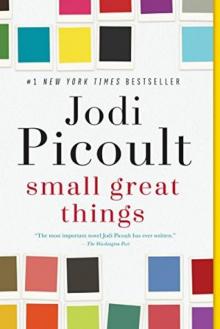 Small Great Things
Small Great Things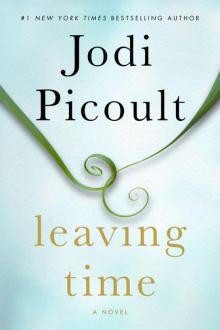 Leaving Time
Leaving Time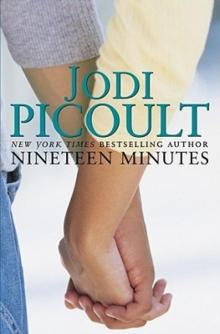 Nineteen Minutes
Nineteen Minutes Larger Than Life
Larger Than Life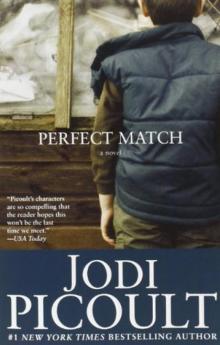 Perfect Match
Perfect Match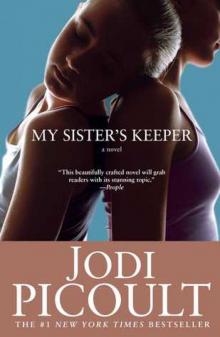 My Sister's Keeper
My Sister's Keeper The Pact
The Pact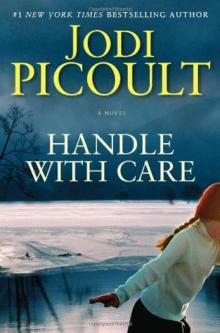 Handle With Care
Handle With Care Songs of the Humpback Whale
Songs of the Humpback Whale Mermaid
Mermaid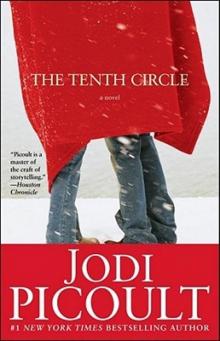 The Tenth Circle
The Tenth Circle The Color War
The Color War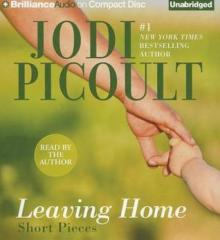 Leaving Home: Short Pieces
Leaving Home: Short Pieces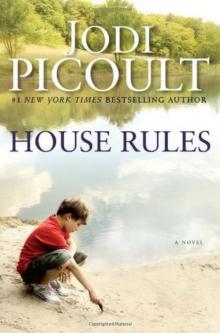 House Rules
House Rules Lone Wolf
Lone Wolf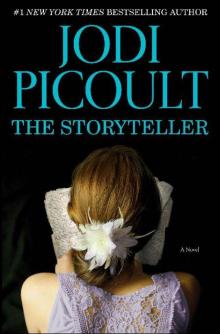 The Storyteller
The Storyteller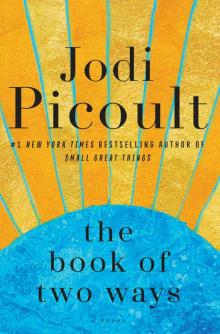 The Book of Two Ways
The Book of Two Ways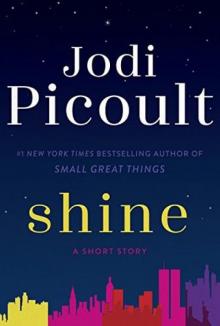 Shine
Shine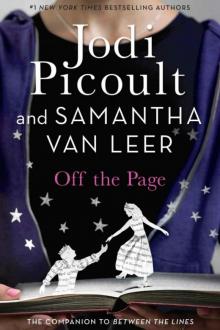 Off the Page
Off the Page Sing You Home
Sing You Home Second Glance: A Novel
Second Glance: A Novel Mercy
Mercy Vanishing Acts
Vanishing Acts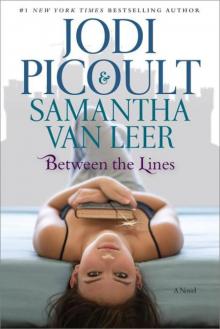 Between the Lines
Between the Lines Plain Truth
Plain Truth Salem Falls
Salem Falls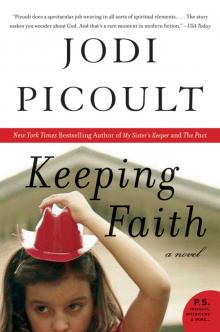 Keeping Faith
Keeping Faith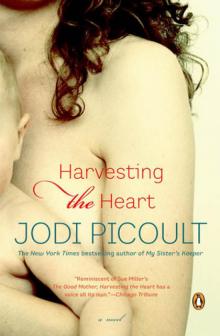 Harvesting the Heart
Harvesting the Heart Change of Heart
Change of Heart Where There's Smoke
Where There's Smoke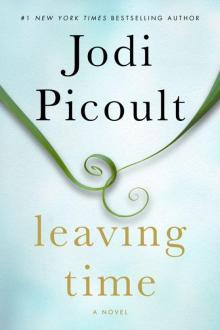 Leaving Time: A Novel
Leaving Time: A Novel Over the Moon
Over the Moon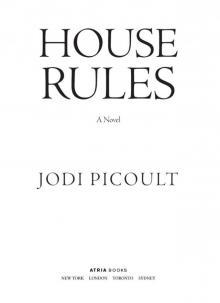 House Rules: A Novel
House Rules: A Novel The Jodi Picoult Collection #2
The Jodi Picoult Collection #2 Leaving Home: Short Pieces (Kindle Single)
Leaving Home: Short Pieces (Kindle Single)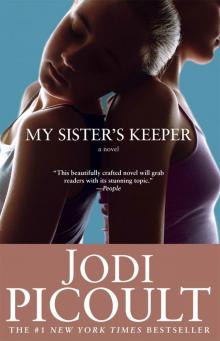 My Sister's Keeper: A Novel
My Sister's Keeper: A Novel![Mermaid [Kindle in Motion] (Kindle Single) Read online](http://i1.bookreadfree.com/i1/04/03/mermaid_kindle_in_motion_kindle_single_preview.jpg) Mermaid [Kindle in Motion] (Kindle Single)
Mermaid [Kindle in Motion] (Kindle Single)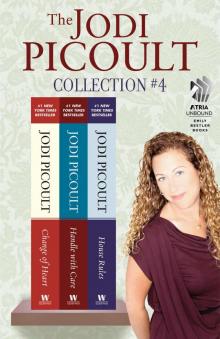 The Jodi Picoult Collection #4
The Jodi Picoult Collection #4 Sing You Home: A Novel
Sing You Home: A Novel The Jodi Picoult Collection
The Jodi Picoult Collection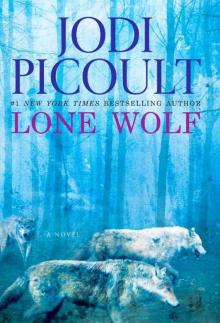 Lone Wolf A Novel
Lone Wolf A Novel Second Glance
Second Glance Larger Than Life (Novella)
Larger Than Life (Novella) The Jodi Picoult Collection #3
The Jodi Picoult Collection #3